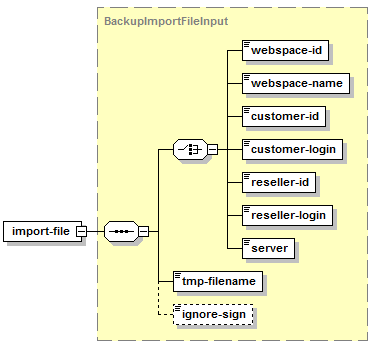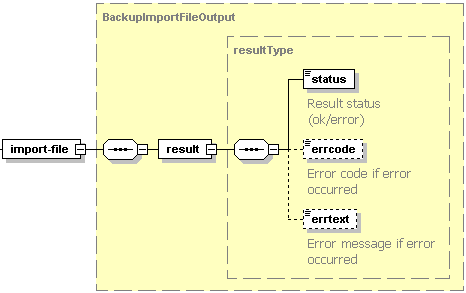Importing Backup to Storage
To add a backup to the local storage, perform the following two steps:
- Upload the backup to the temporary directory on the server using the upload operator. For details on the operator, refer to the section Supported Operations: Uploading Files to Server.
- Add the backup to the local storage using the import-file operator.
Request Packet Structure
A request XML packet moving a backup to the local storage includes the import-file operation node:
<packet>
<import-file>
<put-backup>
...
</put-backup>
</import-file>
</packet>
The import-file node is presented by type BackupImportFileInput
(backup.xsd), and its graphical representation is as follows:

-
The webspace-id node is required. It specifies a subscription ID. Data type: integer.
-
The webspace-name node is required. It specifies a subscription name. Data type: string.
-
The customer-id node is required. It specifies a customer ID. Data type: integer.
-
The customer-login node is required. It specifies a customer login. Data type: string.
-
The reseller-id node is required. It specifies a reseller ID. Data type: integer.
-
The reseller-login node is required. It specifies a reseller login. Data type: string.
-
The server node is required. It instructs Plesk to display server-level backup tasks. Data type: none.
Note: You must specify one of the mentioned nodes in a request packet.
-
The tmp-filename node is required. It specifies full name of the backup retrieved from the response packet of the upload operation. Data type: string.
-
The ignore-sign node is optional. It specifies whether the backup can be imported to Plesk despite an invalid signature. Data type: boolean.
Note: When creating request packets, put nodes and elements in the order they follow in the packet structure.
Note: The interactive schema navigator for all request packets is available here: http://plesk.github.io/api-schemas/1.6.8.0/agent_input.svg.
Response Packet Structure
The import-file node of the output XML packet is presented by type
BackupImportFileOutput (backup.xsd) and structured as follows:

- The result node is required. It wraps the response retrieved
from the server. Data type: resultType (
common.xsd). - The status node is required. It specifies the execution status of the operation. Data type: string. Allowed values: ok | error.
- The errcode node is optional. Is returns the error code if the operation fails. Data type: integer.
- The errtext node is optional. It returns the error message if the operation fails. Data type: string.
Note: The interactive schema navigator for all response packets is available here: http://plesk.github.io/api-schemas/1.6.8.0/agent_output.svg.
Samples
Moving the backup to the local storage of a customer
The request packet moving the backup to the local storage of the customer with ID 54 looks as follows:
<packet>
<backup-manager>
<import-file>
<customer-id>54</customer-id>
<tmp-filename>/usr/local/psa/tmp/MyBackup.bak</tmp-filename>
</import-file>
</backup-manager>
</packet>
Response:
<packet version="1.6.7.0">
<backup-manager>
<import-file>
<result>
<status>ok</status>
</result>
</import-file>
</backup-manager>
</packet>